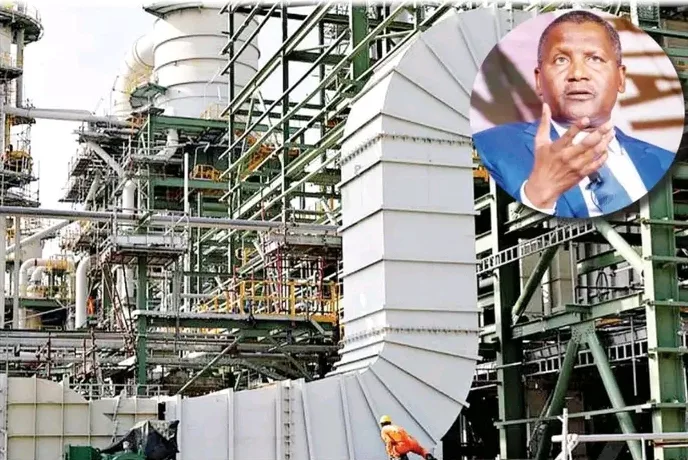Nigeria may at long last be close to a sigh of relief with the palpable coming on stream of the 7- year in-the-making Dangote Refinery.
To put things into perspective, in 2021, Nigeria imported $11.3 billion in refined petroleum, becoming the 18th largest importer of refined petroleum in the world. In that year, refined petroleum was the 1st most imported product in Nigeria.
Considering the transformative effect the Dangote Refinery is expected to have on the Nigerian economy, the coming on stream of the product has over the years assumed the status of being probably as anticipated as October 1, 1960.
Indeed, the world’s biggest about-to-be-completed project will usher in a semblance of independence; yes, energy independence for Nigeria.
When it becomes operational, supposedly sometime in the third quarter of this year, the Dangote Refinery will put paid to the decades-long lingering issue of fuel subsidy. Fuel subsidy, it has been argued, is the cesspit of corruption in Nigeria; the racket bleeds Nigeria trillions of naira annually, with no end in sight as removing fuel subsidies is also one of the most difficult decisions successive federal governments have had to grapple with.
The Nigerian Economic Summit Group (NESG), a prominent African think-tank, has predicted that the inauguration of the Dangote Refinery and Petrochemical Company on May 22 will create a $21 billion market for Nigeria’s crude oil. NESG highlights that the refinery, with its capacity to process 650,000 barrels of crude oil per day, has the potential to meet all of Nigeria’s fuel requirements, including petrol, diesel, jet fuel, and polypropylene. Furthermore, the facility includes loading facilities capable of accommodating about 2,900 tankers and can contribute to the construction of housing units to accommodate 33,000 people.
NESG emphasised that the construction of the 650,000 barrels per day crude oil facility, which spans 2,635 hectares and houses 177 tank farms, would reshape Nigeria’s economy and establish the country as a global energy player.
By addressing Nigeria’s historical reliance on imported refined petroleum products, which has made the economy vulnerable and dependent, the Dangote Refinery and Petrochemical Company aim to change this paradigm. NESG highlighted that the refinery’s extensive capacity can meet 100 per cent of Nigeria’s domestic demand for all refined products, including gasoline, diesel, kerosene, and aviation jet fuel. The surplus production of these products can potentially be exported, positioning Nigeria as a significant player in the global energy market and strengthening the country’s energy independence and security.
The impact of the refinery and petrochemical company extends beyond its refining capabilities. A lecturer at the Department of Banking and Finance, Nnamdi Azikiwe University, Felix Echekoba, highlighted the development of extensive infrastructure to support its operations, including a self-sufficient marine facility with the world’s largest order of five Single Point Mooring systems (SPMs).
Additionally, Dangote has established the world’s largest granite quarry, ready-mix concrete capacity, and an extensive fleet of trucks and cranes, contributing not only to local capacity but also to Nigeria’s broader infrastructure development goals.
The establishment of the Dangote Refinery and Petrochemical Company is expected to create thousands of direct jobs and approximately 100,000 indirect employment opportunities, further contributing to Nigeria’s economic growth and the job market.
“The 435 MW Power Plant in the Refinery alone will be able to meet the total power requirement of Ibadan DisCo of 860,316 MWh covering five States including Oyo, Ogun, Osun, Kwara, and Ekiti,” said an electrical engineer,” Gbenga Omotosho.
The Lagos Chamber of Commerce and Industry (LCCI), the Abuja Chamber of Commerce and Industry (ACCI), and the Manufacturers Association of Nigeria (MAN) have commended the efforts of Alhaji Aliko Dangote and the supportive federal government for their vision and commitment to the project. They acknowledged the refinery’s significant impact on Nigeria’s economy, including foreign exchange savings and generation, job creation, improvement of the value of the naira, and growth opportunities for businesses. These organisations also anticipate further growth and development across the refinery’s value chain, benefiting various sectors such as cosmetics, plastics, textiles, and agribusiness.Experts also said the refinery would save Nigeria $9billion annually.
The Dangote Refinery and Petrochemical Company’s completion and expected commissioning have garnered praise from the business community. The facility’s ability to meet Nigeria’s refined product requirements and generate significant export revenue while saving foreign exchange is seen as a major achievement. With advanced technology and the capacity to process Nigerian crude as well as other crudes, the refinery is expected to contribute to Nigeria’s energy security and mitigate the potential effects of global warming.
Stressing the impact the Dangote project will have on the local economy, an economic affairs analyst, Dr. Amos Emarhenakhoi, said the Dangote Refinery and Petrochemical Company is seen as a transformative project that will elevate Nigeria’s economy, energy security, and global energy market position. It serves as a testament to Nigeria’s ambition, innovation, and determination to shape its own energy future.
Building capacity, the mega-firm is training 900 young engineers in refinery operations outside the country. Another six mechanical engineers have been trained at GE University in Italy. 50 process engineers have been trained by Honeywell/UOP for six months; 50 management trainees for secondment have been trained for succession, all pointing to a real game-changer for Nigeria over the next few years.





